Do you want to create your own customized short URL for your blog?
Customized short URLs are often branded short URLs that are easy to remember and share. We use wpbeg.in for our own branded custom short URLs.
In this article, we’ll show you how to easily create your own customized short URLs for your blog.

Why Use a Branded Customized Short URL in WordPress?
You may have noticed how popular websites like The New York Times, Twitter, Facebook, and TechCrunch use branded short URLs on social media.
The New York times uses nyti.ms, TechCrunch uses tcrn.ch, and WPBeginner uses wpbeg.in domain name for shorter customized URLs.
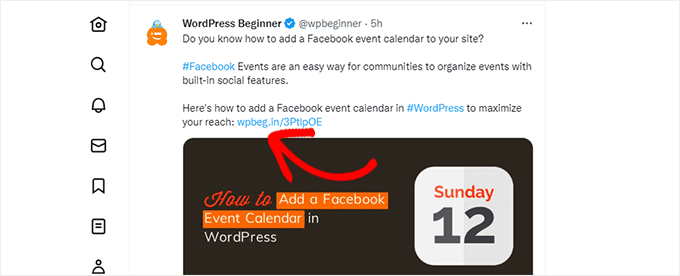
These branded domain names are called domain hacks.
They are created by combining the brand name and a domain TLD to cleverly spell a brand name.
Since most websites use .com as their primary domain, this is a good way to create a short url for your WordPress site. See our tips on picking the best domain for your blog.
Using your own customized short URL improves brand recognition among your users. It also allows you to create shorter URLs for easy sharing on social platforms.
Most importantly, you can easily track these URLs to see how many clicks you got when you shared a URL.
Having said that, let’s see how to create your own branded customized short URLs in WordPress.
Note: If you’re just looking to create memorable short URLs using your main domain, then we recommend using the Pretty Links plugin. This is what top podcasters and YouTubers use to mention short links in their videos.
Step 1: Buy a Short URL or Short Domain Name
Most of us do not have a short URL as our primary domain name. This means you will need to register a new domain name that is much shorter than your current domain.
For example, when choosing a branded shorter domain for WPBeginner.com we registered WPBeg.in. This made our short URL 6 characters shorter than our primary domain.
There are many free domain name generators that allow you to automatically generate domain name suggestions. See our list of 14 best free domain name generators.
Domainr is the one that specializes in helping you find short domains using domain hacks.
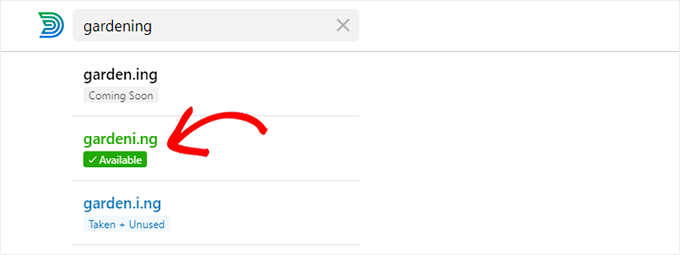
Try different combinations and explore creative ways to spell your brand name.
Once you have found a domain name that meets your needs and is available, you can register it on any of the top domain registrars.
We recommend using Domain.com. They are the best domain registrar on the market and you can get a 25% discount using our Domain.com coupon code.

Other domain registrars that we recommend include Network Solutions and GoDaddy.
The cost of domain name registration depends on which TLD you select. Country-specific TLDs cost a little more than some other new TLDs.
Once you have registered your domain name, you will be able to manage it from your domain registrar’s control panel.
Step 2: Setup Your Custom Domain in Bitly
Bitly is a popular URL shortner service that allows you to manage and track links. We use it to shorten our WordPress URLs and manage them.
First, you will need to create a Bitly account. You’ll need at least Basic plan to use your own custom domain name for link shortening.
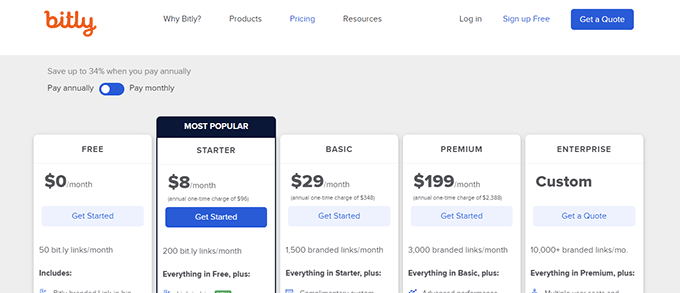
After completing the sign up, you’ll reach your Bitly account dashboard.
From here, you need to click on Account settings » Custom domains menu and then click on the Add a domain button.
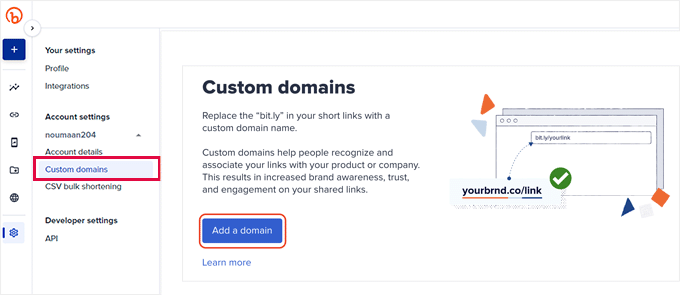
On the next screen, you’ll see options to buy a new domain name or use your own domain name.
Go ahead, and click on the ‘I want to use my own domain name’ option to continue.
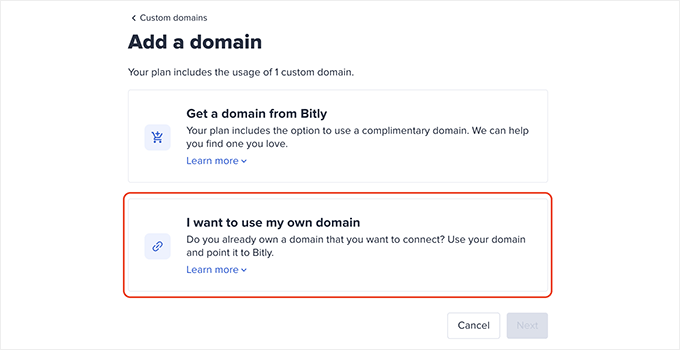
Next, enter the domain name you recently purchased.
Below that, select ‘No, this is an unused domain name’ option and click Next.
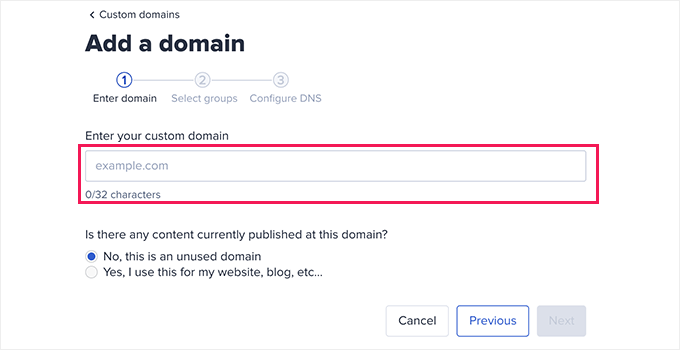
Now you will see the option to choose a group.
Bitly allows you to organize your links, domains, and users into groups. This allows you to limit certain domains to specific users.
Choose All groups to make your custom domain available for all groups.
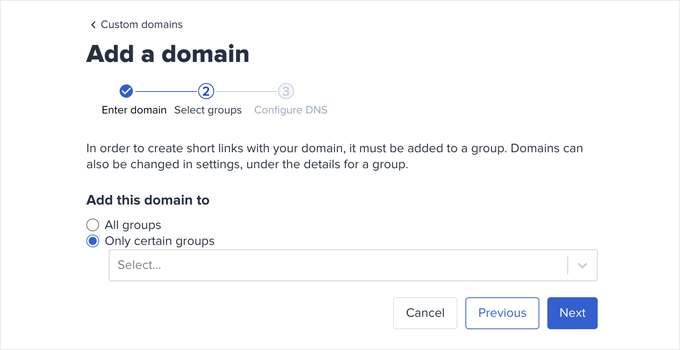
Next, you will be asked to add DNS records to your branded domain name before continuing.
You can leave this window open and proceed to the next step.
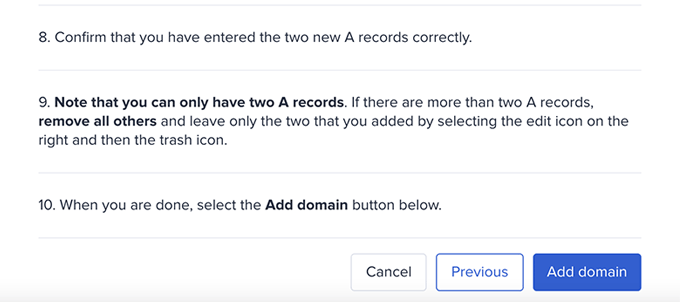
Step 3: Set DNS A Record to Point to Bit.ly
In order to create your own branded custom short URLs, you need to point your domain to Bitly servers.
To do that, you will need to add DNS records to your custom domain name. DNS records are kind of instructions that point domain name to proper servers.
You can find the DNS records that you need to add on Bitly website.

There are two types of DNS records that you can add.
For root domain names (e.g. wpbeg.in), you’ll need to enter A records.
However, If your custom domain is a subdomain (e.g. on.wsj.com), then you’ll need to enter the CNAME records.
To add the records, simply visit the domain management area on your domain registrar’s website and look for DNS records.
If you took our advice and registered your domain with Domain.com, then you will find the DNS & Nameservers settings under the left column.
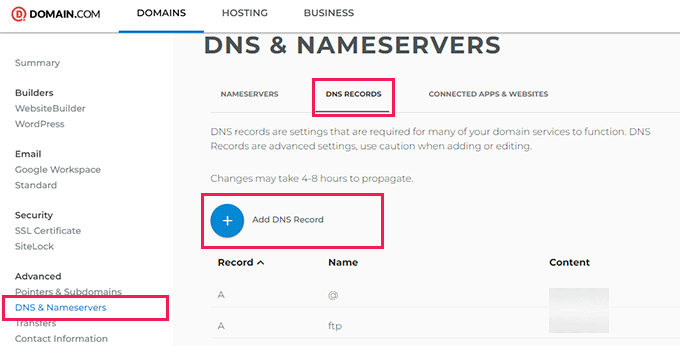
Switch to the DNS Records tab and then click on the Add DNS Record button.
This will bring up a popup where you need to enter the following information
- Hostname under the Name field
- Choose A as the Type
- Copy and paste the Bitly IP address
- Choose 1 hour under the TTL
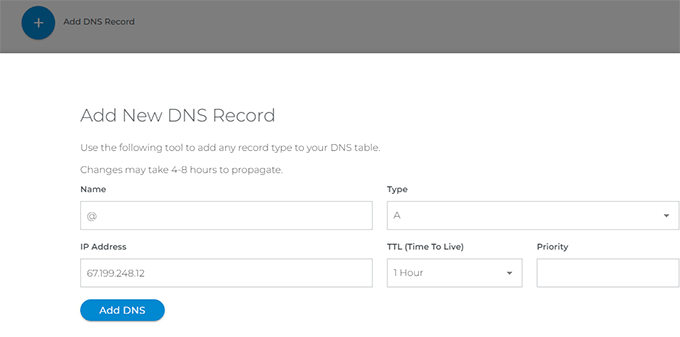
Click on the Add DNS button to save your settings.
If you are using a subdomain for example on.wsj.com, then you need to set a CNAME record and point it to cname.bitly.com
After adding DNS records you can switch back to Bitly website and click on the Add Domain button.

Now, you will see a notification that your domain settings are being verified.
Bitly will check your domain for DNS records and if everything looks ok you’ll recieve an email notification.
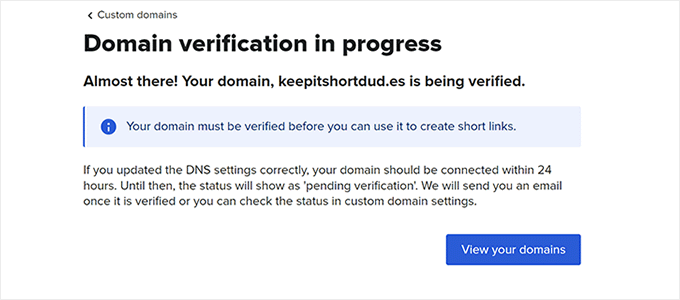
Step 4: Set up Short URL on Your WordPress Site
The best part about using Bitly is that you can easily manage, share, and track your short URLs directly from your WordPress site.
First, thing you need to do is install and activate the Bitly’s WordPress Plugin. For more details, see our step by step guide on how to install a WordPress plugin.
Upon activation, you need to visit Settings » Writing page and scroll down to the ‘WP Bitly Shortlinks’ section.
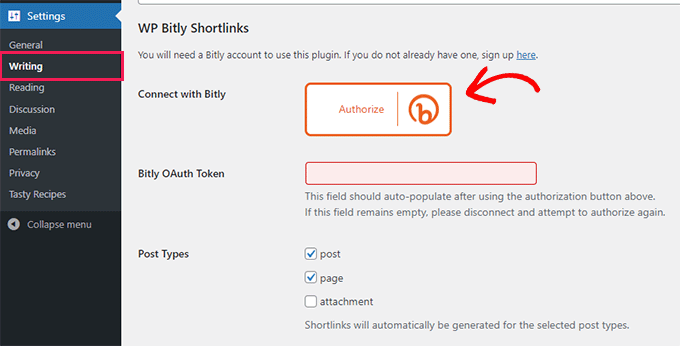
Simply click on the Authorize button and then Allow Bitly to connect your WordPress site.
Once connected, you can choose which post types you want to generate shortlinks for. Below that, you can choose the default domain that you added earlier.
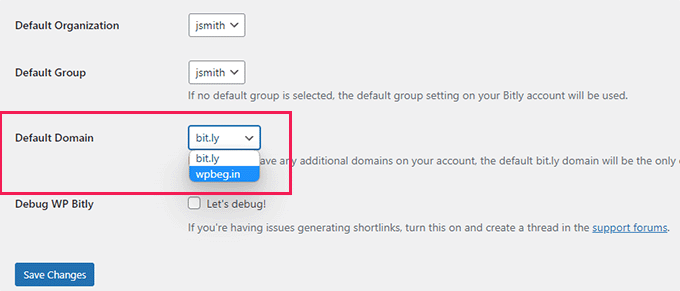
Don’t forget to click on the Save changes button to store your settings,
The plugin will now start generating your custom branded short URLs. You can see them by visiting your Bitly dashboard.
WP-Bitly plugin will also show you BitLy stats for each post. You can see those stats by editing a post and look for WP Bitly metabox.
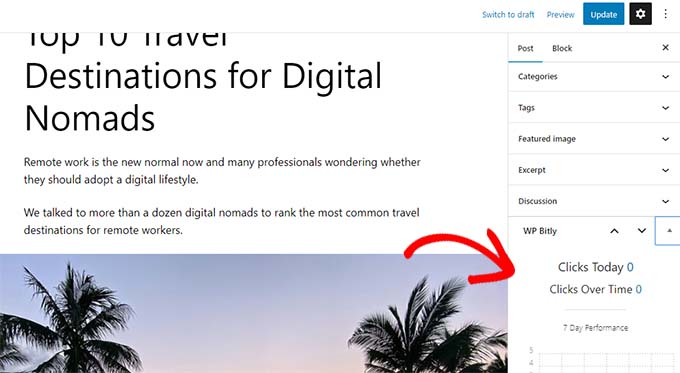
This will allow you to track how many times your short URL for this post has been clicked and from which websites.

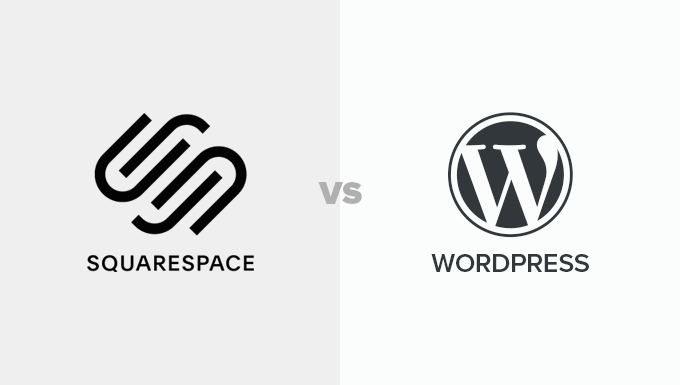


More Stories
SEO Title vs H1 Post Title in WordPress: What’s the Difference?
How to Check If Your WordPress Blog Posts Are Ranking for the Right Keywords
Is It Safe to Use Outdated WordPress Plugins? (Explained)